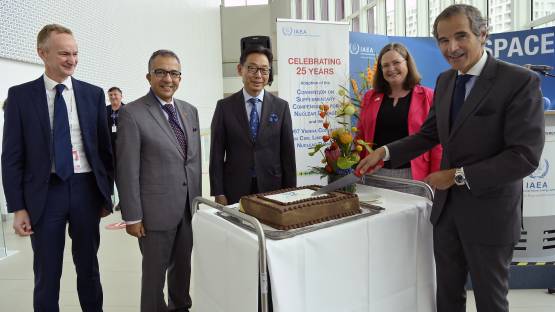State representatives provided remarks commemorating this milestone in modernizing the nuclear liability regime and ensuring its global reach.
The Permanent Representative of the United States to the IAEA, Laura Holgate, highlighted the benefits of joining the CSC for nuclear and non-nuclear States, noting that “a nuclear accident anywhere is a nuclear accident everywhere.” She emphasized that the CSC had established the pathway towards a global nuclear liability regime with enhanced protections for victims and coastal States and better possibilities for the nuclear industry to participate in nuclear projects around the world.
Azzeddine Farhane, the Permanent Representative of Morocco to the IAEA, recalled that Morocco had signed the CSC on 29 September 1997, the day it was first opened for signature. Morocco was the second State to ratify the CSC, and it is the only State that is party to all four nuclear liability instruments under IAEA auspices. “Morocco’s adherence to all these nuclear liability instruments shows its commitment to having in place effective and coherent nuclear liability mechanisms at the national and global levels,” Ambassador Farhane said.
Takeshi Hikihara, the Permanent Representative of Japan to the IAEA, noted that the Third Meeting of the Contracting Parties and Signatories to the CSC would take place in Japan in June 2023 under the chairpersonship of Taro Hokugo, Managing Director and Head of the International Affairs Group at the Nuclear Damage Compensation and Decommissioning Facilitation Corporation. Ambassador Hikihara stated, “the compensation for the Fukushima Daiichi Accident […] proved the effectiveness of the international nuclear liability principles in compensating the victims promptly and impartially while maintaining the legal predictability for the industry.”
Finally, Chris Heffer, Director of Nuclear Power and Decommissioning at the United Kingdom’s Department for Business, Energy and Industrial Strategy, described the ongoing legislative process of enabling the United Kingdom to accede to the CSC. The UK would be the first Contracting Party to the Paris Convention on Nuclear Third Party Liability to join the CSC.
Wolfram Tonhauser, Head of the Nuclear and Treaty Law Section of the IAEA’s Office of Legal Affairs, closed the event by highlighting that the 1997 nuclear liability instruments had brought about the modernization and globalization of the nuclear liability regime with significant benefits for both the victims of nuclear damage and the nuclear industry.





